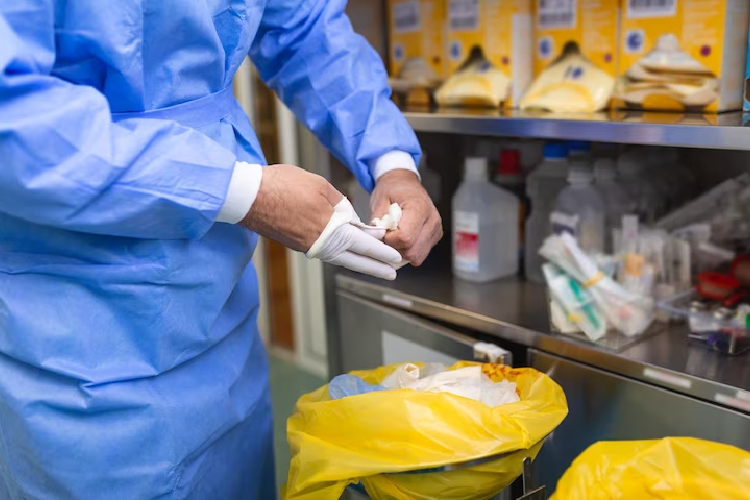Proper pharmaceutical waste disposal companies is essential for protecting our environment, as well as the health and well-being of consumers, workers, and local wildlife. Management of pharmaceutical waste requires strategic planning and a thorough understanding of the waste disposal process. With the right knowledge and techniques, organizations can minimize their environmental impact while maximizing their cost savings. This article will explore some of the proven strategies for safe pharmaceutical waste disposal, including physical and chemical treatments, containers and labeling, and other disposal options. By implementing these techniques and resources, organizations can ensure they are compliant with all relevant regulations and are doing their part to protect the environment.
Understanding the Basics of Safe Pharmaceutical Waste Disposal
Pharmaceutical waste disposal companies are generally defined as any medicine that has been administered to a patient or otherwise distributed but is no longer necessary, suitable, or effective for its intended use. Generally, it consists of any drug that is expired, damaged, or otherwise mislabeled, including over-the-counter medications, prescription medications, patches, IV bags, syringes, and vials. As such, effective disposal of this type of hazardous material is paramount to maintaining a safe and healthy environment for personnel and patients alike.

When it comes to the disposal of these materials, it is vital to ensure that proper safety procedures are followed. Start by understanding the regulations in your particular region. Regulations can vary depending on the country, state, and even facility. It is also important to recognize that certain pharmaceutical items—such as cytotoxic drugs, chemotherapy drugs, hormones, and narcotics—may require special procedures for disposal.
A good place to start when disposing of pharmaceutical waste is to become familiar with the proper safety protocols for handling and storage. This includes identifying containers that are certified for pharmaceutical disposal, establishing a system for storing all expired, damaged, or mislabeled medications, and creating educational materials for staff and patients on the proper disposal of such substances.
Becoming Comfortable with Regulations for Pharmaceutical Waste Disposal
Different countries, states, and even facilities have different regulations regarding the disposal of pharmaceutical waste. This includes identifying certified containers for pharmaceutical disposal, establishing a system for storing expired medication and developing instructional materials for staff and patients on the proper disposal of such substances. It is also important to note that certain types of pharmaceuticals—such as cytotoxic drugs, chemotherapy drugs, hormones, and narcotics—have special regulations regarding their disposal. Not only can improper labeling lead to confusion and spillage, but it can also result in fines or penalties depending on the circumstances.
Identifying Containers for Safe Pharmaceutical Waste Disposal
When selecting a container for disposing of pharmaceutical waste, be sure to confirm that the container meets safety standards. In particular, the container should be leak-proof, air-tight, and puncture-resistant. Additionally, some containers may have special features such as an antimicrobial interior coating to minimize the spread of infection or a tight-fitting lid for secure closure and transport. Choosing the right container is an important step in safe pharmaceutical waste disposal. It is the first line of defense against any hazardous materials, and it’s essential to help ensure the safety of personnel and the environment.
Developing and Implementing Employee Training and Education Programs
To ensure proper safety protocols and proper disposal, it is essential to develop and implement employee training and education programs. This will help to ensure that staff members are familiar with all applicable safety regulations and protocols and can quickly and accurately identify any potential risks when handling or disposing of pharmaceuticals. This education should include detailed instructions on the proper storage of medications, the proper labeling and labeling of containers, the proper disposal techniques, and any other safety guidelines specific to the facility.
Working with Professionals to Obtain Specialized Waste Disposal Advice
When dealing with pharmaceutical waste disposal, it is always essential to obtain professional advice about the best procedure. Professionals, such as specialized waste disposal companies, can provide an expert opinion on how to ensure safe disposal. Depending on the size and type of pharmaceutical waste, it is helpful to have a professional team assess the amount and condition of the waste before determining the ideal disposal methods. Having an expert team assess the situation helps to alleviate safety risks associated with mishandling and improper disposal.
Conclusion
Overall, there are several proven strategies for safely disposing of pharmaceutical waste. By following the correct protocols for handling and disposing of pharmaceuticals, healthcare professionals can ensure the proper disposal of pharmaceuticals to protect the health of patients and healthcare workers. This includes following the principles of proper handling, labeling, storage, transport, and management that are outlined in government and healthcare regulations. Furthermore, healthcare professionals should be cognizant of their local, state, and federal laws on the disposal of pharmaceuticals and keep up to date with all applicable guidelines. By following the outlined guidelines, healthcare professionals can safely dispose of pharmaceuticals to help protect public health.

Francis Burns is an avid writer from Louisiana. With a Bachelor’s in English and a background in journalism, Francis has been writing for a variety of media outlets for the last five years. He specializes in stories about the local culture and loves to fill his work with inspiring words. When not writing, Francis enjoys exploring the outdoors of Louisiana and photographing nature.




